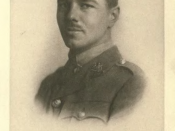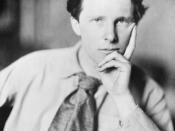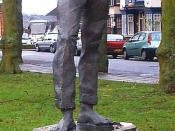Although Rupert Brooke and Wilfred Owen both wrote war poems they differ broadly from each other. Despite the fact that both authors' have a totally different opinion concerning war they have certain aspects in common.
In Rupert Brooke's poem The Soldier he develops a glorifying idea of patriotism. He seeks to transmit the message that it is beautiful to die for one's country - it embellishes death - and that no matter where he is buried the soil he is buried within will absorb his English body, acquire English ways and become in its turn, part of England. Brooke had never taken part in war itself therefore he could not comprehend the genuine vileness of war. He conveys no notion of sorrow or loss at the suggestion of the soldier's death. It seems that the soldier does not even fear death; it is more likely that he is more concentrated on the importance of the idea that even through death he will continue to be English.
All through The Soldier Brooke communicates a feeling of bravery, nobility and heroism. It reveals this through flurry and idealistic language - "Wash'd by the rivers, blest by the suns of home" - transforming it into a dramatic reading due to its frequent pauses in the middle of sentences with the use of punctuation - "If I should die, think only this of me:" , "A dust whom England bore, shaped, made aware, Gave, once, her flowers to love, her ways to roam,". This poem makes use of hazy and attractive images using romantic and vague language such as "That there's some corner of a foreign field That is forever England. There shall be in that rich earth a richer dust conceal'd;". England is widely mentioned throughout The Soldier by means of personification.



War poetry
Many of the 'pro-war' poets were actually commissioned by the governemnt as a form of propaganda, but that would mean a whole new angle. As it is, the essay is well structured and quotes validate your arguments well. A good analysis.
3 out of 3 people found this comment useful.